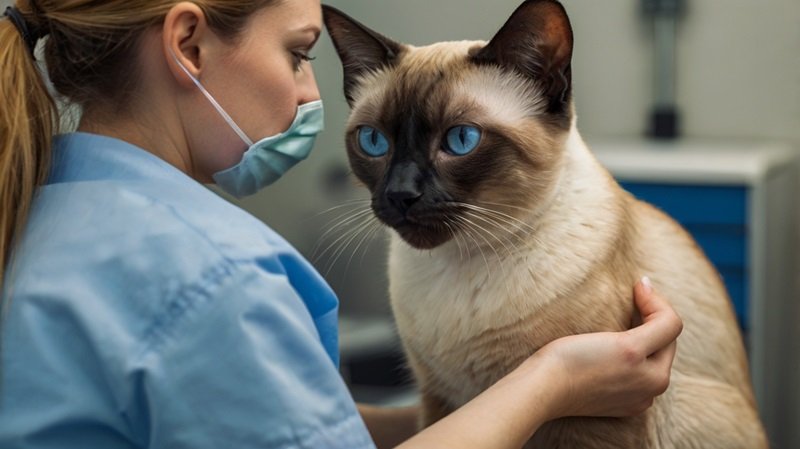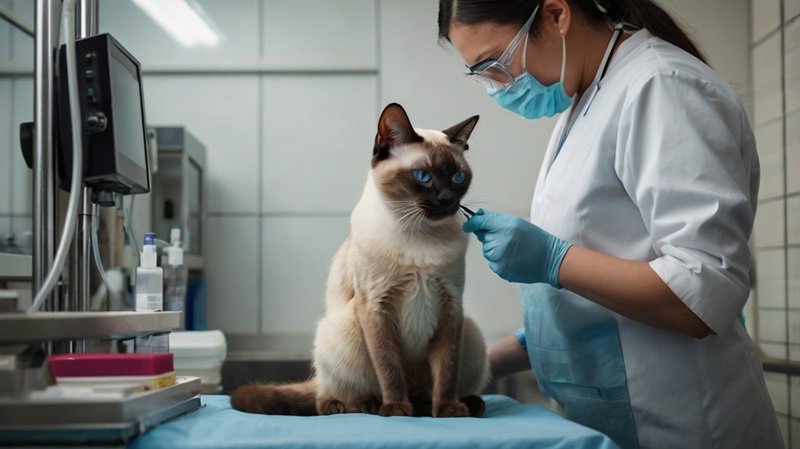With their distinctive appearance and loving personality, Siamese cats can be prone to specific health issues that every owner should watch for. Your Siamese companion may face unique genetic predispositions that set them apart from other breeds. Understanding these conditions can help you detect early warning signs and seek timely veterinary care. You’ll need to pay special attention to their respiratory health, eye conditions, and potential neurological disorders, as these are among the most common health challenges affecting this beloved breed.
Key Takeaways:
- Siamese cats are particularly prone to respiratory issues like asthma – watch for coughing, wheezing, and labored breathing as early warning signs
- Regular vet check-ups are important as these cats can develop organ problems like amyloidosis, showing symptoms through excessive thirst and weight loss
- Eye conditions, especially Progressive Retinal Atrophy (PRA), are common in Siamese cats – look for night blindness and bumping into objects
- Behavioral changes and skin sensitivity could indicate Feline Hyperesthesia Syndrome – excessive grooming and back twitching are key indicators
- Siamese cats may be more susceptible to certain cancers – monitor for unusual lumps, changes in appetite, and unexplained lethargy
Breathing Disorders
For Siamese cats, respiratory issues can be particularly concerning as they are genetically predisposed to various breathing problems. These conditions can affect your cat’s quality of life and require immediate attention. Understanding the common respiratory disorders can help you identify potential problems early and seek appropriate veterinary care.
Asthma
Among respiratory conditions, asthma is one of the most common in Siamese cats. Your cat’s airways can become inflamed and narrow, making it difficult to breathe. Environmental factors like dust, pollen, and smoke can trigger asthma attacks, which may require immediate medical intervention.
Signs and Symptoms
For your Siamese cat, breathing disorders often manifest through distinct warning signs. You might notice your cat coughing, wheezing, or breathing with an open mouth. Rapid or labored breathing, especially during rest, can indicate respiratory distress.
But there’s more you need to watch for in your Siamese cat. Your pet might show decreased activity levels or avoid exercise. You might notice them adopting a hunched posture with extended neck and blue-tinted gums in severe cases. These symptoms can worsen at night or during periods of stress, and your quick response to these signs can make a significant difference in treatment success.
Gastrointestinal and Organ Issues
You should be aware that Siamese cats are particularly susceptible to various digestive and organ-related conditions. Their unique genetic makeup makes them more prone to developing liver and kidney problems, which can affect their overall health and lifespan if not detected early.
Amyloidosis
Beside regular health issues, Siamese cats have a higher genetic predisposition to amyloidosis, a condition where protein deposits accumulate in organs, particularly affecting the liver. This condition can lead to organ failure if not diagnosed and treated promptly, typically appearing in cats between 1-5 years of age.
Indicators of Illness
Beside obvious signs, you should watch for symptoms like decreased appetite, excessive thirst, and lethargy. Your Siamese cat may also show signs of discomfort through behavioral changes, such as hiding more often or avoiding their usual activities.
Indeed, monitoring your cat’s daily habits is necessary for early detection. You might notice changes in litter box habits, including more frequent urination or different stool consistency. Pay attention to your cat’s weight, as sudden weight loss can be a significant indicator of gastrointestinal or organ issues. Regular vet check-ups can help catch these problems early, improving the chances of successful treatment.
Eye Conditions
Keep your Siamese cat’s eye health in check, as these felines are genetically predisposed to various eye problems. Their distinctive blue eyes, while beautiful, can be susceptible to several conditions that may affect their vision and overall well-being. Early detection and regular veterinary check-ups are important for preventing vision loss.
Progressive Retinal Atrophy (PRA)
Below age two, your Siamese cat may start showing signs of PRA, an inherited condition causing gradual vision loss. This degenerative disease affects the retina’s photoreceptor cells, leading to eventual blindness. While there’s no cure, early diagnosis can help you prepare your home environment to accommodate your cat’s changing needs.
Symptoms to Observe
Progressive vision loss typically begins with night blindness, where your cat may show hesitation in dark spaces. Watch for signs such as bumping into furniture, reluctance to jump, or dilated pupils that don’t respond well to light. These symptoms often appear between 1.5 to 2 years of age.
Even subtle changes in your cat’s behavior can indicate developing eye problems. You might notice your pet becoming more cautious when moving around, especially in dimly lit areas. They may also show increased clinginess, rely more on their whiskers for navigation, or become startled by sudden movements they previously would have noticed easily.
Neurological Disorders
To protect your Siamese cat from neurological issues, you should be aware that these cats are genetically predisposed to various brain and nervous system conditions. Your Siamese might face challenges like vestibular disease or seizures, which can affect their balance and coordination. Early detection and proper veterinary care can significantly improve treatment outcomes.
Feline Hyperesthesia Syndrome
Across Siamese cat populations, this condition manifests as extreme sensitivity to touch along the spine and tail. Your cat may display sudden bursts of activity, aggressive grooming, or skin rippling. This syndrome can be triggered by stress or environmental changes, making a calm environment crucial for your pet’s well-being.
Recognition of Behavior Changes
At the first signs of neurological issues, you might notice your Siamese cat showing unusual behaviors. Watch for sudden mood changes, disorientation, or loss of balance. These symptoms could indicate developing neurological problems requiring immediate veterinary attention.
Hyperesthesia symptoms in your Siamese can include excessive grooming, tail chasing, or skin twitching. Your cat might become unusually aggressive or vocal during episodes. If you notice these behaviors, tracking their frequency and intensity can help your veterinarian develop an effective treatment plan.
Cancer in Siamese Cats
Once again, Siamese cats face a higher risk of developing certain types of cancer compared to other breeds. Your Siamese cat’s genetic predisposition makes them particularly susceptible to mammary tumors and lymphoma. Early detection through regular veterinary check-ups can significantly improve your cat’s chances of successful treatment.

Types of Cancer
Types of cancer commonly found in Siamese cats include:
| Cancer Type | Common Locations |
|---|---|
| Mammary Cancer | Breast tissue |
| Lymphoma | Lymph nodes, intestines |
| Squamous Cell Carcinoma | Skin, mouth |
| Mast Cell Tumors | Skin, internal organs |
| Intestinal Cancer | Digestive system |
Warning Signs
Cancer symptoms in your Siamese cat can manifest in various ways. Watch for unexplained weight loss, decreased appetite, unusual lumps, or changes in behavior. Any unusual symptoms lasting more than a few days warrant immediate veterinary attention.
With cancer detection, timing is everything. Your vigilance in monitoring your cat’s health can make a significant difference in treatment outcomes. Look for changes in eating habits, energy levels, and physical appearance. Early intervention offers the best chance for successful treatment.
Preventive Care and Management
Unlike other breeds, Siamese cats require specific preventive measures due to their genetic predisposition to certain health issues. Your proactive approach to healthcare can significantly reduce the risk of developing breed-specific conditions and ensure your Siamese cat maintains optimal health throughout their life.
Regular Veterinary Visits
With Siamese cats being prone to various health conditions, you should schedule bi-annual checkups with your veterinarian. Your cat needs regular screenings for common issues like respiratory problems and eye conditions. These visits allow for early detection of potential health problems, increasing the chances of successful treatment.

Proper Nutrition and Exercise
On a daily basis, you should provide your Siamese cat with high-quality protein-rich food specifically formulated for their life stage. Regular exercise through interactive play sessions helps maintain healthy weight and prevents obesity-related health issues that can affect your cat’s joints and organs.
Care for your Siamese cat’s nutritional needs by measuring portions carefully and avoiding overfeeding. You should offer fresh water daily and monitor their eating habits closely. If you notice changes in appetite or weight, consult your veterinarian, as these could be early warning signs of health issues common to the breed.
Summing up
Taking this into account, your Siamese cat’s health requires consistent monitoring for early warning signs of common breed-specific conditions. By staying alert to changes in your cat’s breathing patterns, vision, behavior, and eating habits, you can catch potential health issues before they become severe. Regular vet check-ups, along with your attentive care, will help detect conditions like asthma, amyloidosis, PRA, or hyperesthesia syndrome in their early stages. When you notice any unusual symptoms in your Siamese companion, prompt veterinary consultation will ensure the best possible outcome for your pet’s health.
FAQ
How can I tell if my Siamese cat has respiratory problems?
Watch for signs like wheezing, persistent coughing, open-mouth breathing, or rapid breathing. You might also notice your cat avoiding physical activity or breathing with an extended neck position. If you observe these symptoms, schedule a veterinary appointment immediately as respiratory issues can become serious quickly.
What are the signs of kidney disease in Siamese cats?
Common signs include increased thirst, frequent urination, weight loss despite normal eating habits, vomiting, and decreased appetite. You might also notice your cat’s coat becoming dull and unkempt. Regular blood work and urinalysis can help detect kidney problems early.
How do I know if my Siamese cat has eye problems?
Look for signs such as bumping into objects, reluctance to jump or climb, dilated pupils that don’t respond to light, cloudiness in the eyes, or excessive tearing. Siamese cats are particularly prone to cross-eyes and progressive retinal atrophy, which can lead to vision loss.
What behavioral changes might indicate my Siamese cat is ill?
Watch for changes like decreased interaction with family members, hiding more than usual, aggression, changes in litter box habits, or unusual vocalization patterns. These behavioral shifts often indicate underlying health issues and warrant veterinary attention.
How often should I check my Siamese cat for potential health issues?
Perform weekly health checks by examining your cat’s eyes, ears, mouth, and body for any unusual lumps, sores, or changes. Monitor their eating, drinking, and bathroom habits daily. Schedule veterinary check-ups twice yearly for professional assessment and early detection of breed-specific health concerns.


